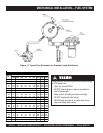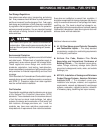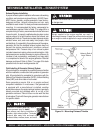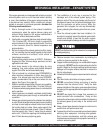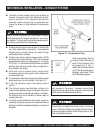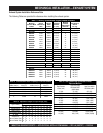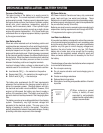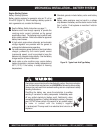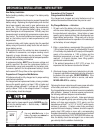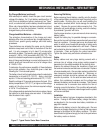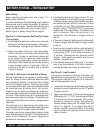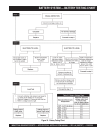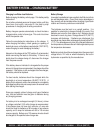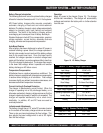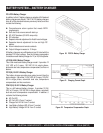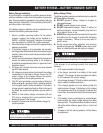
PAGE 52 — INDUSTRIAL GENERATOR SETS — APPLICATION & INSTALLATION MANUAL — REV. #4 (09/07/07)
MECHANICAL INSTALLATION — NEW BATTERY
New Battery Installation
Before handling a battery, refer to page 11 for
battery safety
instructions
.
Replacement batteries should equal or exceed the specified
battery ratings. Replacing the original battery with one that
has a lower capacity may result in poor performance and
shorter life. If the replacement battery has considerably
less capacity than the specified battery rating, it may not
crank the engine at cold temperatures. Difficulty may also
be experienced in cranking high compression engines when
they are hot. The
hot start
condition can impose a cranking
load on the battery equal to loads experienced at cold
temperatures.
A premium battery with higher capacity than the specified
battery rating will provide a safety factor that will result in
longer battery service.
If the electrical load of the vehicle has been increased by
the addition of accessories, and engine cranking occurs
frequently, a larger alternator may be required. A larger
alternator will provide increased output at low speed operation
and will improve battery performance.
A replacement battery MUST have the same voltage and
polarity specified. Be sure the replacement battery is
dimensionally correct and compatible for the battery rack.
To ensure a perfect fit for the replacement battery, it should
be the same BCI Group Size as the original battery.
Preparation of Charged and Wet Batteries
All batteries should be fully charged and in proper working
order before installation.
If a charged and wet replacement battery is being installed,
be sure the specific gravity is at least 1.250 or higher and
the battery voltage is at least 2.1 volts per cell. If the specific
gravity is below 1.250, or the voltage is below 2.1 volts per
cell, the battery should be charged.
Preparation of Dry Charged &
Charged and Moist Batteries
Dry charged
and
charged and moist batteries
must be
activated as described below before they can be used:
Dry Charged Batteries — Activation
1. Fill each cell of the battery to the top of the separators
with the correct battery-grade electrolyte as specified in
the manufacturer's instructions. Using higher or lower
specific gravity electrolyte than that recommended can
impair battery performance. Filling each cell to the top
of the separators allows for expansion of the electrolyte
as the battery is boost charged.
2. When a manufacturer recommends filling gravities of
1.265 or higher, boost charge 12-volt batteries at 15 amps
(12-volt heavy duty batteries at 30 amps) until the specific
gravity of the electrolyte is 1.250 or higher and the
electrolyte temperature is at least 60°F (15.5°C) are
reached. (In tropical climates, lower filling specific
gravities are recommended.)
If the ambient temperature is 32°F (0°C) or less, it is
imperative that the above instruction be followed.
3. After boost charge, check level of electrolyte in all cells.
If required, add additional electrolyte to bring all levels to
the bottom of the vent wells. DO NOT OVERFILL. If the
battery requires top-off while in service, add water.
NEVER ADD ACID to a battery.
Following the above instructions will insure proper activation
of the battery and result in satisfactory performance.
Dry charged batteries may be placed in service immediately
after activation. However, to ensure superior performance,
the following additional steps are recommended:
Check the specific gravity of all cells. Under good storage
conditions, the specific gravity upon activating a dry-charged
battery will drop approximately 0.010 points and the
temperature will rise 7° to 10°F (4° to 5.6°C) within twenty
minutes of activation. A battery under these conditions
requires little boost charging. However, should the specific
gravity drop 0.030 points or more, with a corresponding
increase in temperature, the negative plates become oxidized
and the battery should be FULLY RECHARGED before use.
Also, the battery should be recharged if one or more cells
gas violently after the addition of electrolyte.
Use only
distilled
water in the
battery. Tap water can
reduce
the
operating life of the battery.
NOTE
If it should become necessary to dilute concentrated
sulfuric acid to a lower specific gravity ALWAYS pour the
acid into the distilled water — do this slowly — NEVER
pour water into acid.



